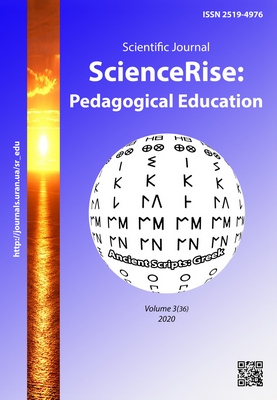Anti-discrimination educational program against labor migration: case of rural school
DOI:
https://doi.org/10.15587/2519-4984.2020.200425Keywords:
labor migration, rural school, non-discriminatory educational environment, lifelong learningAbstract
The article outlines the reasons for the labor migration of the rural able-bodied population to the urban zone and its consequences, both personally for people and for the village and the community. The link between migration and schooling is analyzed. Creating a non-discriminatory school environment has been studied as one of the ways of preventing migration. The role of the modern educator, who is a continuous learner, in particular in the process of creating a non-discriminatory space of the educational establishment as an equal-opportunity space, is determined by the example of the Ohijivka Educational Complex. The activity of the Anti-discrimination Center of the Ohijivka Educational Complex has been studied to determine specific directions and ways of providing information and methodological and practical support for conducting an anti-discrimination examination of school textbooks, gender analysis of lessons, replacing the visual space by the gender-sensitive one, conducting lessons without transitions, teaching and transacting gender audit of an educational institution.
The article describes how participating in the pilot-level work at the regional level "Scientific and methodological foundations of implementing gender approaches in the system of educational institutions work for in 2014-2018" contributed to the disclosure of the creative potential of participants, the development of their critical thinking, reflective abilities and readiness for new ideas. After all, both teachers and students have learned from their positive experience that lifelong learning enhances the competitiveness of both individuals and the educational institution as a whole, and shapes democratic values. It was shown, that the next step of the institution's effective activity was creating an environmental project "Collect Separate Garbage – Make a Happy Life," which spread to the entire community. Thus, due to the inspiration and trend-oriented work of the school staff, the local population’s consciousness that understands that it is much more comfortable to live in an anti-discriminatory and ecologically friendly environment has been changing. The indicators of the number of the able-bodied rural population in recent years are also analyzed
References
- Bochkovska, A. I., Rudenko, L. H. Karty Natsionalnoho atlasu Ukrainy yak informatsiina baza dlia doslidzhennia formuvannia chyselnosti naselennia. Available at: https://igu.org.ua/uk/node/21095 Last accessed: 04.02.2020
- Derzhavna sluzhba statystyky Ukrainy. Naselennia. Available at: http://www.ukrstat.gov.ua/operativ/operativ2007/ds/nas_rik/nas_u/nas_rik_u.html Last accessed: 03.02.2020
- Kruhlyi stil «Silskyi ta ahrarnyi rozvytok: stan ta perspektyvy». Available at: http://www.nas.gov.ua/EN/Messages/Pages/View.aspx?MessageID=5338 Last accessed: 05.02.2020
- Bilsborrow, R. E. (2002). Migration, population change, and the rural environment. Environmental change and security program, 8, 69–94. Available at: http://legacy.wilsoncenter.org/sites/default/files/Report_8_BIlsborrow_article.pdf Last accessed: 06.02.2020
- Lucas, R. E. B. (2001). The effects of proximity and transportation on developing country population migrations. Journal of Economic Geography, 1 (3), 323–339. doi: http://doi.org/10.1093/jeg/1.3.323
- Mazzucato, V. (2005). The Study of Transnational Migration: Reflections on a Simultaneous Matched-Sample Methodology. Workshop on Migration and Development Within and Across Borders. New York City. Available at: https://www.researchgate.net/publication/308602073_Operationalising_Transnational_Migrant_Networks_through_a_Simultaneous_Matched_Sample_Methodology Last accessed: 05.02.2020
- Ajaero, C. K., Onokala, P. C. (2013). The Effects of Rural-Urban Migration on Rural Communities of Southeastern Nigeria. International Journal of Population Research, 2013, 1–10. doi: http://doi.org/10.1155/2013/610193
- Kuklin, D. (2019). Stereotyp – tse brekhnia pro realnist abo 7 vidpovidei na zapytannia pro antydyskryminatsiinu ekspertyzu shkilnykh pidruchnykiv. Available at: https://ukr.lb.ua/society/2019/04/06/423834_stereotip_tse_brehnya_pro.html Last accessed: 03.02.2020
- Pro skhvalennia Kontseptsii realizatsii derzhavnoi polityky u sferi reformuvannia zahalnoi serednoi osvity «Nova Ukrainska Shkola» na period do 2029 roku (2016). Rozporiadzhennia Kabinetu Ministriv Ukrainy No. 988. 14.12.2016. Available at: https://zakon.rada.gov.ua/laws/show/988-2016-р Last accessed: 05.02.2020
- Hender v osviti. Pro Ohiivskyi NVK: reportazh kharkivskoho telebachennia. Available at: https://www.youtube.com/watch?v=2_V0cTQ8z3s Last accessed: 09.12.2019
- Hendernyi informatsiino-analitychnyi tsentr «KRONA». Available at: http://www.krona.org.ua/ Last accessed: 07.02.2020
- Tsentr hendernoi kultury. Available at: https://www.genderculturecentre.orgLast accessed: 05.02.2020
- Hender v detaliakh. Available at: https://genderindetail.org.uaLast accessed: 03.02.2020
- Nedyskryminatsiinyi pidkhid u navchanni. Available at: https://courses.ed-era.com/courses/course-v1:EdEra-Studena+Inc+1/aboutLast accessed: 05.02.2020
- Zhinky ta choloviky: hender dlia vsikh. Available at: https://courses.prometheus.org.ua/courses/IRF/101/2015_T2/about Last accessed: 03.02.2020
- Teaching Tools. Available at: https://globaldignity.org/teaching-dignity/teaching-tools/ Last accessed: 05.02.2020
- Hendernochutlyva naochnist dlia shkil ta dytsadkiv. Available at: http://www.krona.org.ua/naochnist.html Last accessed: 04.02.2020
- EdCamp Ukraine. Available at: https://www.youtube.com/watch?v=kC92EWUTFxM Last accessed: 05.02.2020
- Zbyrai rozdilno smittia – bude shchaslyvym zhyttia: shkilne video pro pochatok ekolohichnoho proektu Ohiivskoho navchalno-vykhovnoho kompleksu Sakhnovshchynskoi raionnoi rady Kharkivskoi oblasti. Available at: https://www.youtube.com/watch?v=cIpEZrb4LEw Last accessed: 09.12.2019
- Kich, T. (2017). Ekolohichna problema sela na Kharkivshchyni: do spravy vzialysia dity. Slobidskyi krai. Available at: https://www.slk.kh.ua/news/oblast-online/diti-pridumali_-yak-virishiti-ekologichnu-problemu-sela-na-kharkivshchini.html Last accessed: 08.12.2019
- Kich, T. (2017). Dity vykhovuiut doroslykh. Slobidskyi krai. Available at: https://www.slk.kh.ua/amp/news/suspilstvo/smittya-feniks-yak-pozbutisya-ekologichnoyi-zarazi-nazavzhdi-.html Last accessed: 08.12.2019
Downloads
Published
How to Cite
Issue
Section
License
Copyright (c) 2020 Valentyna Kakadii, Oleg Marushchenko, Olena Masalitina

This work is licensed under a Creative Commons Attribution 4.0 International License.
Our journal abides by the Creative Commons CC BY copyright rights and permissions for open access journals.
Authors, who are published in this journal, agree to the following conditions:
1. The authors reserve the right to authorship of the work and pass the first publication right of this work to the journal under the terms of a Creative Commons CC BY, which allows others to freely distribute the published research with the obligatory reference to the authors of the original work and the first publication of the work in this journal.
2. The authors have the right to conclude separate supplement agreements that relate to non-exclusive work distribution in the form in which it has been published by the journal (for example, to upload the work to the online storage of the journal or publish it as part of a monograph), provided that the reference to the first publication of the work in this journal is included.








